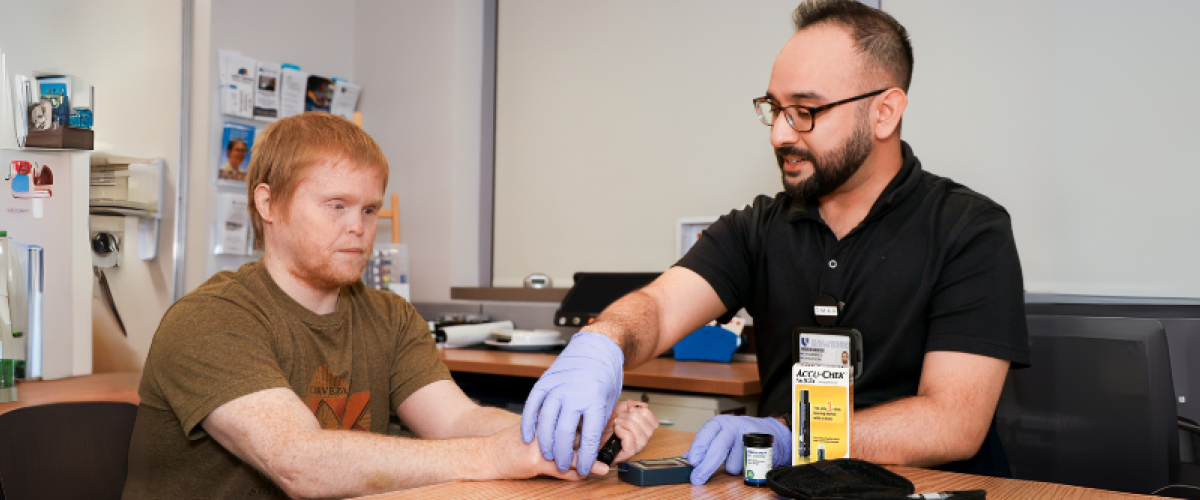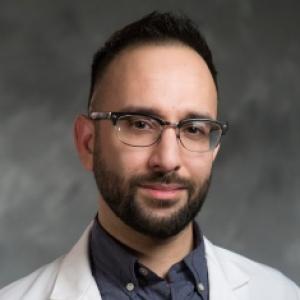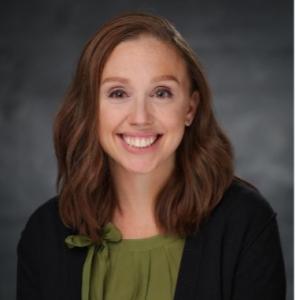
OUR MISSION AND GOALS
The mission and philosophy of the Vision Rehabilitation Occupational Therapy Fellowship at the Duke Eye Center is to develop and graduate practitioners who, by demonstrating critical thinking ability, competence in assessment, clinical skills, and adherence to ethical standards, are committed to promoting and advancing the vision rehabilitation subspecialty through skilled patient care, teaching, advocacy, and research. To achieve this mission, our goal is to provide a post-professional, specialty-focused educational and hands-on clinical training experience to occupational therapists to equip them to perform the following skills in this Vision Rehabilitation setting that can be carried into future clinical settings:
- Utilize current evidence-based occupational therapy information to make informed client-centered plans of care.
- Demonstrate ability to effectively communicate and collaborate with members of a multidisciplinary team, patients and care providers needed to address activity limitations and visual performance deficits secondary to visual disorders.
- Apply advanced occupational therapy interventions to address a variety of functional limitations commonly encountered when working with people with visual impairment.
- Participate in the development of new or innovative occupational therapy techniques and the collection of evidence to support the effectiveness of those techniques to enhance the practice of occupational therapy in the vision rehabilitation field.
- Provide educational community-based health and wellness programs as it relates to visual performance, skill development, activities of daily living, safety and other related occupational therapy topics.
WHAT MAKES OUR PROGRAM UNIQUE
Our fellowship is designed to include participation and exposure to a wide variety of vision rehabilitation experiences as is available in this specialty eye care center to build a strong foundation of knowledge of functional vision impairments and therapeutic skills. Upon participation in the fellowship program, the Fellow will:
- Learn from OT mentors who are certified low vision therapists (CLVTs), on-site optometrists and ophthalmic technicians.
- Learn from in-patient and out-patient clinics within the Duke Health System and observe with home-based low vision OT sessions at a community level.
- Acquire the knowledge and skills necessary to treat a wide variety of patients who have functional limitations related to eye disease, eye injury, neurological or congenital conditions.
- Develop professional presentation skills through opportunities to instruct fieldwork students in clinical skills, present team and community-based educational sessions, and lead literature review discussions to translate evidence to practice.
- Develop a formal presentation related to advancing occupational therapy in the vision rehabilitation subspecialty.
- Obtain the required clinical competencies and observation/ clinical hours to pursue the designation of Certified Low Vision Therapist (CLVT) offered through the Academy for Certification of Vision Rehabilitation & Education Professionals (ACVREP).
HIGHLIGHTS OF OUR PROGRAM
Your fellowship year will include interaction with the Vision Rehabilitation team of certified low vision therapists (CLVTs) / OTs, optometrists, ophthalmic technicians, social work services and other eye care professionals. Fellowship enrichment activities related to clinical treatment are provided with autonomy for the fellow to schedule those opportunities throughout the Duke Eye Center, and may include visits to other clinical areas within the Duke Health System (geriatric and neuro OT/PT/SLP, driving assessment program, etc.), and other community-based eye care services (home-based low vision OT, orthoptics, ocularist, etc.). Interprofessional development occurs through participation with Vision Rehabilitation team meetings, and at periodic meetings with other Duke Health fellows and residents to discuss cases through narrative reasoning presentations. Professional advocacy is incorporated through participation in state and national conferences, with the option for presentation proposal submission (NCOTA, AOTA, etc.), vision rehabilitation platforms (Envision), and participation in an OT Month or Low Vision advocacy projects.
Faculty
Contact Information
For more information, please contact the fellowship director Fay Tripp or Vision Rehabilitation Occupational Therapy at 919-684-8961.






